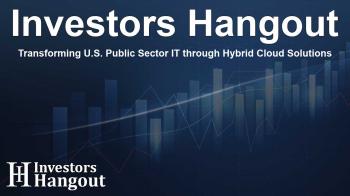Transforming U.S. Public Sector IT through Hybrid Cloud Solutions

The Rise of Hybrid Cloud in the Public Sector
As state and local agencies adapt to new technological demands, many are increasingly selecting hybrid cloud managed services as a means to modernize outdated legacy systems. This phenomenon has become crucial for entities facing strict budget constraints and a shortage of skilled personnel.
Key Insights From Recent Research
A recent report highlights that a significant shift towards hybrid cloud strategies is underway among state, local, and educational (SLED) organizations. This transformation focuses on modernization, cybersecurity, and cloud solutions, emphasized by the slow growth of the SLED IT market due to limited resources. Despite this, a staggering 90 percent of these agencies are poised to adopt hybrid cloud frameworks in the near future.
Driving Forces Behind IT Modernization
Public agencies utilize IT modernization strategies that yield measurable outcomes, primarily through AI-driven tools and automation technologies. As Nathan Frey, a partner at ISG and leading voice on public sector projects notes, managed service providers play an essential role in maintaining IT infrastructures and facilitating digital transformation efforts.
The Challenge of Legacy Systems
Many public sector organizations continue to grapple with legacy systems that are often decades old, resulting in high operational costs and inefficiencies. Agencies intent on replacing these outdated systems with advanced, secure, and scalable cloud solutions often lack the necessary in-house expertise. Thus, managed service providers become vital partners in this transition, ensuring smooth upgrades and compliance with regulations.
Embracing Automation and AI
As they navigate the complexities of modern IT architectures, public agencies are actively adopting automation and AI for IT operations (AIOps). These powerful tools help identify potential issues early on and can automate repetitive tasks, thereby enhancing overall efficiency. AIOps further assist organizations in analyzing vast quantities of data, leading to actionable insights and informed decision-making.
Importance of Data Management
Data management remains a top priority for SLED agencies aiming to improve service delivery and make better policy choices. Managed services offer comprehensive solutions that comprise data storage, enhanced security measures, and sophisticated analytics, ensuring the protection and effective organization of sensitive information.
Managing Costs with FinOps Tools
Financial sustainability in advancing IT capabilities is paramount. Public-sector agencies have begun adopting FinOps tools supplied by managed services to monitor cloud expenditures closely. Furthermore, many organizations are leveraging flexible pay-as-you-go service agreements to align their spending directly with usage, thereby enhancing budgetary control and reducing operational costs.
The Future of Public Sector IT Transformation
Advanced cloud service models empower public agencies to enhance operational efficiency even amidst significant constraints. As detailed by Shashank Rajmane from ISG, these technological advancements ultimately make governmental processes more efficient and user-friendly, fostering greater engagement with citizens.
Current Trends in Private and Hybrid Clouds
Moreover, the report examines evolving trends within the public sector's private and hybrid cloud space. This includes the influence of regulatory requirements and the urgency to dismantle data silos, facilitating better data sharing across various agencies.
Conclusion
For those interested in exploring the current cloud challenges faced by U.S. public-sector agencies, the comprehensive insights provided by ISG can be invaluable. Their research sheds light on contemporary solutions and strategies to tackle these challenges effectively.
Frequently Asked Questions
What is hybrid cloud, and why is it important for public agencies?
Hybrid cloud combines private and public cloud environments, enabling public agencies to modernize IT systems while maintaining flexibility and control over their data management.
How can managed service providers support public sector transformation?
Managed service providers offer crucial support by providing expertise, technology solutions, and resources needed for a successful transition to cloud systems.
What are the benefits of automation in public sector IT?
Automation enhances efficiency, reduces operational costs, and allows public agencies to focus on strategic initiatives rather than routine tasks.
Why is data management critical for improving public services?
Effective data management enables agencies to provide better services to citizens and make more informed decisions based on comprehensive data analysis.
What role do FinOps tools play in agency cloud consumption?
FinOps tools help agencies optimize cloud spending by providing detailed insights and aligning costs with actual usage, promoting financial sustainability.
About The Author
Contact Riley Hayes privately here. Or send an email with ATTN: Riley Hayes as the subject to contact@investorshangout.com.
About Investors Hangout
Investors Hangout is a leading online stock forum for financial discussion and learning, offering a wide range of free tools and resources. It draws in traders of all levels, who exchange market knowledge, investigate trading tactics, and keep an eye on industry developments in real time. Featuring financial articles, stock message boards, quotes, charts, company profiles, and live news updates. Through cooperative learning and a wealth of informational resources, it helps users from novices creating their first portfolios to experts honing their techniques. Join Investors Hangout today: https://investorshangout.com/
The content of this article is based on factual, publicly available information and does not represent legal, financial, or investment advice. Investors Hangout does not offer financial advice, and the author is not a licensed financial advisor. Consult a qualified advisor before making any financial or investment decisions based on this article. This article should not be considered advice to purchase, sell, or hold any securities or other investments. If any of the material provided here is inaccurate, please contact us for corrections.

